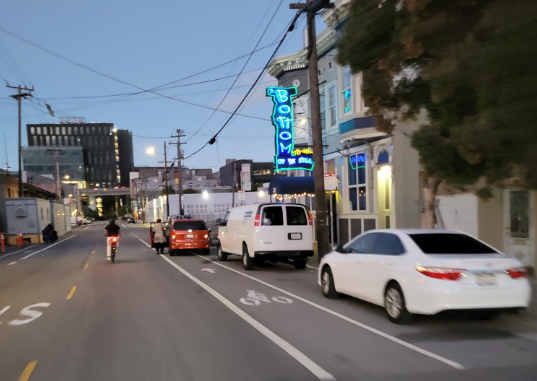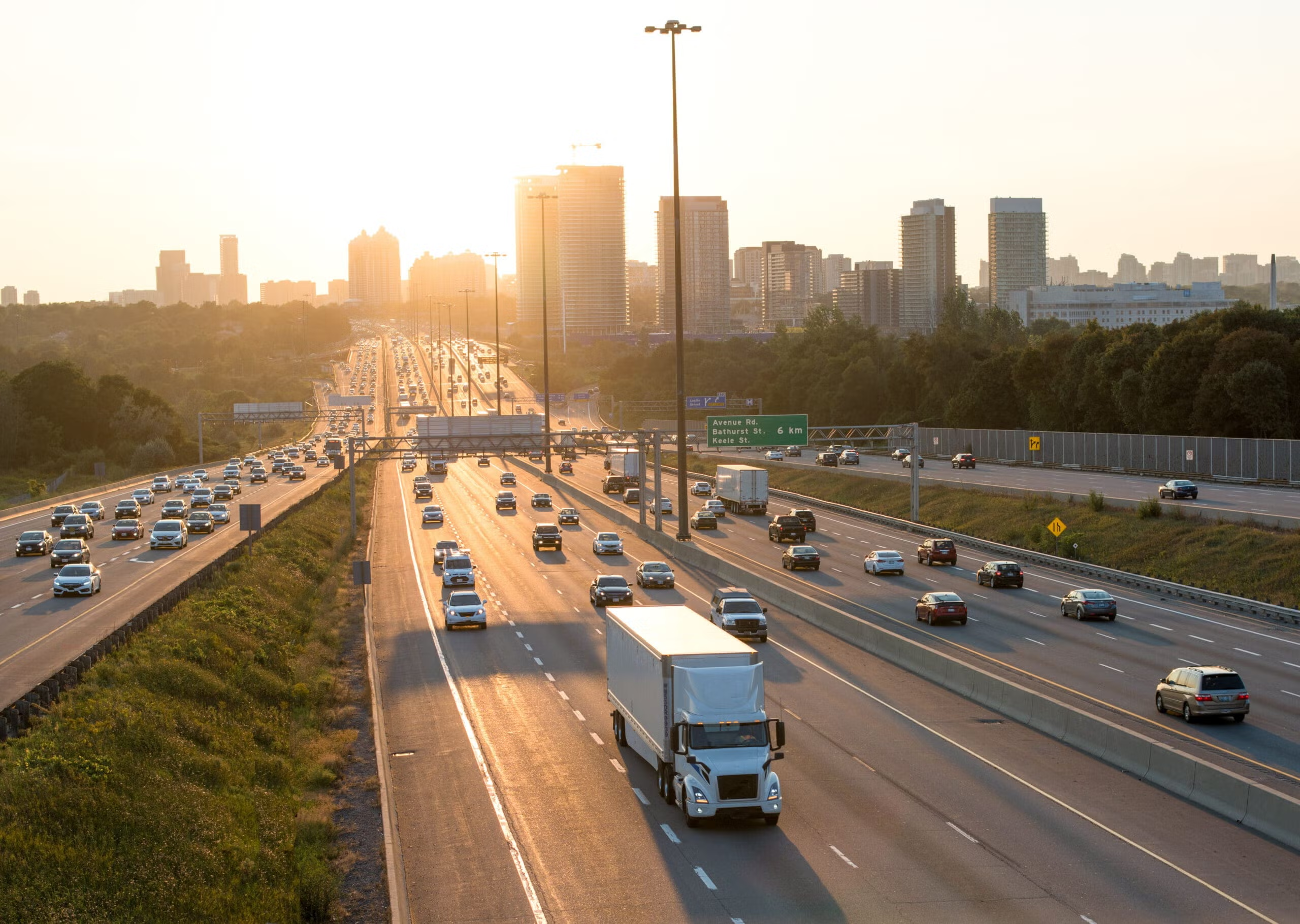Editor's note: This post originally appeared on the California Bicycle Coalition's site.
Of the bills the California Bicycle Coalition supported that made it to the governor’s desk, six were signed into law, and two were vetoed. Several active transportation measures were put on hold before the end of the legislative session, becoming two-year bills, and some did not make it out of legislative committees.
Overall, it was not a good year for decriminalization measures that sought to bring more equity to the enforcement of minor infractions and fare evasion. And the budget shortfall delayed measures such as the proposal to give free transit passes to students.
Here’s the full recap of bills CalBike supported and monitored in the 2023 legislative session.
Six bills signed into law
- Daylighting to Save Lives (A.B. 413, Lee): This law creates a statewide standard of a 20-foot setback for car parking from marked and unmarked crosswalks. The measure gives communities the flexibility to set shorter or longer clearances based on the speed of the street. The extra visibility will help prevent collisions between drivers and pedestrians, reducing the horrendous toll on our roadways. The next task for advocates is to make sure local governments know about the law and add signage and curb painting to inform drivers.
- Caltrans Freeway Data (S.B. 695, Gonzalez): As the recent firing of Jeanie Ward-Waller showed, Caltrans needs more oversight. S.B. 695 requires the agency to provide data on its projects in a public portal and present them at California Transportation Commission meetings. CalBike has struggled to get Caltrans data; information on how many miles are under the agency’s management and how many miles it’s adding to the freeway system, among other things, will help us understand where transportation dollars are going and better focus our advocacy.
- Deadly Oversized Cars (A.B. 251, Ward): The increase in the size of SUVs and light trucks has coincided with a rise in pedestrian fatalities. This will study the impact of these bloated vehicles on traffic deaths and injuries as well as the extra wear and tear on California’s roadways. The study will recommend whether the state should levy an additional fee for oversized vehicles.
- Automated Speed Enforcement Pilot (A.B. 645, Friedman): Perseverance delivered a big victory, getting a pilot for automated speed enforcement across the finish line after several years of setbacks for this measure. The pilot will allow six cities to use cameras to issue speeding tickets. Cameras (if placed equitably) eliminate racial bias in speed enforcement. Automating enforcement also allows cities to crack down on speeding continuously, providing a consistent disincentive to drive at dangerous speeds.
- Cars Blocking Bike Lanes (A.B. 361, Ward): With this law, cities can now install forward-facing cameras on city-owned vehicles for the purpose of video imaging bike lane parking violations. This will give communities greater capacity to ensure that bike infrastructure is not illegally repurposed as car storage.
- Tenancy & Micromobility (S.B. 712, Portantino): Landlords will no longer be allowed to prevent tenants from owning a personal micromobility device, such as a scooter or bike, or from storing that device in their dwelling unit unless the landlord provides secure, long-term storage for those devices.
Two new laws we’re watching
Two of the active transportation bills the governor signed were on CalBike’s watch list of bills we weren’t opposing but weren’t actively supporting. We’ll be keeping an eye on these new laws to pressure agencies to implement them in ways that support rather than hinder people getting around by bike.
- Bike Czar at Caltrans (S.B. 538, Portantino): We’re concerned this position could be greenwashing rather than moving Caltrans toward bike-friendly project designs. Ward-Waller’s firing underscores that concern, but maybe the high-profile blowback from that decision will force the agency to take active transportation more seriously. CalBike will keep an eye on this position and advocate for it to have real power to make change at Caltrans.
- E-Bike Safety Study (S.B. 381, Min): Like much of the discussion of e-bike safety lately, this measure is a double-edged sword. If the study produces information on how to keep e-bike riders and all people on bikes safer on our streets, it could be a positive measure. However, if the study focuses narrowly on e-bikes without considering unsafe road conditions that lead to deadly crashes, it may not lead to helpful insights. We hope to have opportunities to weigh in on the implementation of this measure to ensure it helps, not hurts, people who get around by bike.
Two disappointing vetoes
Governor Newsom nixed the two decriminalization bills that made it through the legislature, displaying a bias toward listening to the voices of law enforcement groups rather than transportation justice advocates - or evidence of what is and isn’t effective at crime prevention.
- Safe Passage for Bikes (A.B. 825, Bryan): In an ideal world, protected, connected bikeways would allow people to get around every California community by bike. Unfortunately, that’s not the world we live in, and unless our state radically changes its transportation funding priorities, we won’t have enough safe bike infrastructure for many years. In the meantime, the Safe Passage for Bikes Bill would have let people on bikes, traveling around 10 mph, share the sidewalk with people walking. While there were valid concerns for pedestrian safety, we felt the bill addressed those. With this veto, the governor has condemned people on bikes to risk their lives sharing the street with speeding, two-ton vehicles or risk a ticket (and being racially profiled) for riding on the sidewalk. This is a loss for equitable access to our streets and freedom from harassment for people of color, who are mostly likely to be stopped by police. The state is not guaranteeing safe passage for bikes throughout California, but local leaders can still make this a reality by decriminalizing sidewalk riding in their communities or instructing police not to ticket people on bikes where the sidewalk is the safest alternative.
- Decriminalize Transit Fare Evasion (A.B. 819, Bryan): This bill would have removed criminal penalties for people with repeat tickets for failing to pay for their transit rides. While we want transit agencies to have the funding they need to provide reliable service, we shouldn’t fund that on the backs of people unable to pay the fare. Most fare evasion tickets go unpaid, and jail time is no solution. Providers don’t have to pursue criminal penalties for fare evasion, and some California transit agencies have already eliminated it. We hope more will follow suit.
Budget wins for active transportation in a lean fiscal year
Because of the projected budget shortfall, the governor’s initial budget cut $500 million from active transportation funding. CalBike rallied our supporters to ask the legislature to restore these critical funds, and our representatives listened. The final budget restored all the funding, and, as a result, the Active Transportation Program was able to greenlight more worthy projects to make biking and walking safer.
In addition, a funding trailer bill allocated $80 million to the California Air Resources Board for clean transportation programs. CARB’s draft budget puts $18 million of that amount toward more e-bike incentives. Thanks to CalBike supporters who emailed CARB in support of this allocation. It still needs board approval before it’s final, and we’ll let the CARB Board of Directors know this measure has our strong support.
The same budget trailer bill also included funding for the Transit Transformation Task Force (A.B. 761, Friedman), which will develop policies to grow transit ridership and improve the transit experience for all users.
As we celebrate these wins, we’re already working on our budget priorities for 2024. Once again, we’ll be asking the state to shift more transportation spending from freeway expansion to Complete Streets and other projects that support the transition to the greenest transportation options: biking, walking, and public transit.
Four two-year bills
Four bills CalBike supported became two-year bills. These bills need to be out of committee by January 2024 to have another chance to become law in the next legislative session.
- Regional Prioritization for Clean Transportation (A.B. 6, Friedman): Requires regional transportation agencies to prioritize and fund transportation projects that significantly contribute toward regional and state climate goals
- Transportation Project Selection Process (A.B. 7, Friedman): Requires state transportation agencies to incorporate environmental and equity principles into their project selection process
- Bicycle Safety Stop (A.B. 73, Boerner Horvath): Legalizes stop-as-yield for bike riders aged 18 or older
- Free Transit for Youth (A.B. 610, Holden): Establishes pilot program that provides grants to transit agencies for the costs of creating and implementing free youth transit passes to persons attending certain educational institutions
Six bills that didn’t make it
Good ideas sometimes take more than one try to make it into law. The process often involves revising the provisions of a bill in consultation with stakeholders and the governor’s office. In some cases, it’s a question of timing and the political climate.
RIP for six excellent bills that didn’t make it out of the legislature. May they rise again.
- The Stop Baseless Searches Bill (A.B. 93, Bryan) would have curtailed baseless searches of people biking and driving. Protecting people from police harassment is essential to creating safe streets, and we hope this measure returns in some form in the future.
- The Stop Pretextual Policing Bill (S.B. 50, Bradford) would have limited police from stopping drivers and people on bikes for low-level infractions. It would have prevented police from stopping people on bikes solely for minor infractions such as riding on the sidewalk or riding without a light. Black and brown bike riders are disproportionately stopped by police, so this would have been a big step forward for equitable streets.
- The Equity-First Transportation Funding Act (A.B. 1525, Bonta) would have prioritized transportation funding for historically underserved communities. It’s a good way to begin to correct the harms of decades of underfunded streets and punitive urban planning.
- Highway Pilot Projects to Reduce Emissions (A.B. 981, Friedman) would have required Caltrans to complete ten highway maintenance and rehabilitation demonstration projects that would have resulted in significantly reduced emissions of greenhouse gases.
- California Bike Smart Safety Handbook (A.B. 1188, Boerner) would have required the DMV to write a bicycle handbook. It died in Appropriations.
- No More Warrants for Infractions (A.B. 1266, Kalra) was a bill to eliminate the use of bench warrants for minor infractions. It would have reduced the potential for violence and police overreaction at traffic stops.






